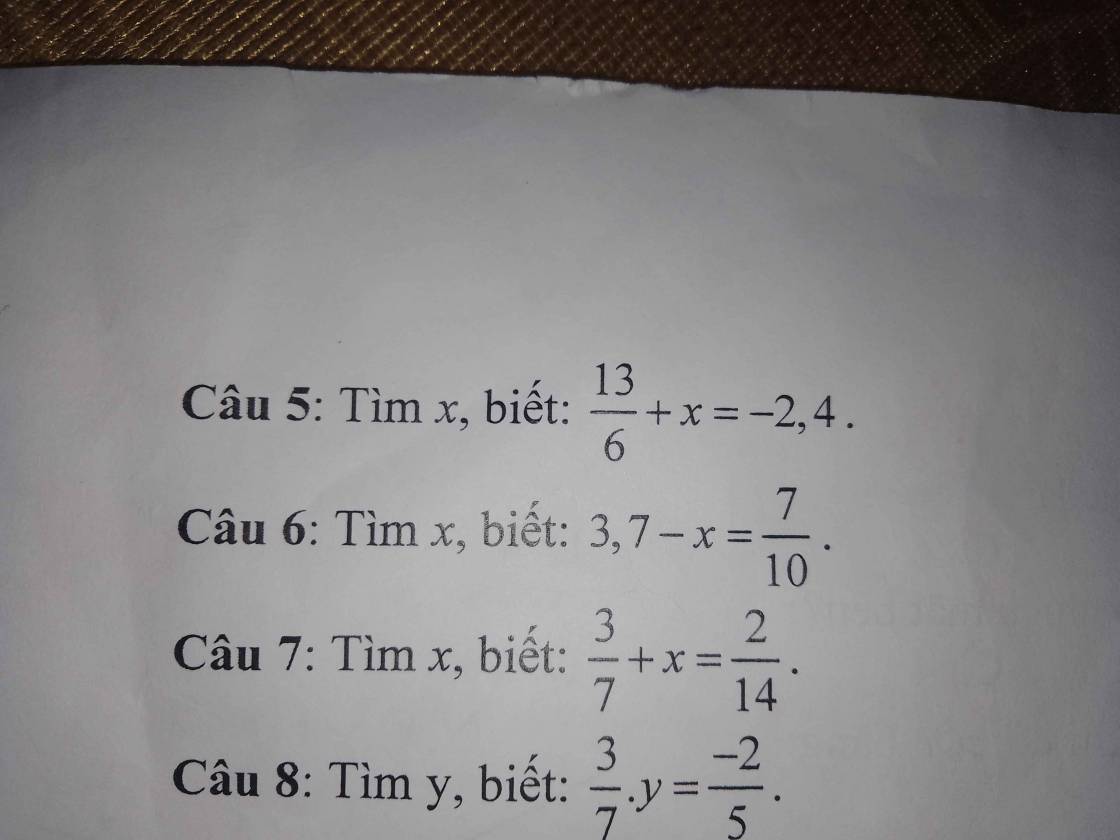
Hãy nhập câu hỏi của bạn vào đây, nếu là tài khoản VIP, bạn sẽ được ưu tiên trả lời.


Câu 3:
a: \(BD=\sqrt{BC^2-DC^2}=4\left(cm\right)\)
b: \(\widehat{A}=180^0-2\cdot70^0=40^0< \widehat{B}\)
nên BC<AC=AB
c: Xét ΔEBC vuông tại E và ΔDCB vuông tại D có
BC chung
\(\widehat{EBC}=\widehat{DCB}\)
Do đó:ΔEBC=ΔDCB
d: Xét ΔOBC có \(\widehat{OBC}=\widehat{OCB}\)
nên ΔOBC cân tại O
Câu 2
a) Thay y = -2 vào biểu thức đã cho ta được:
2.(-2) + 3 = -1
Vậy giá trị của biểu thức đã cho tại y = -2 là -1
b) Thay x = -5 vào biểu thức đã cho ta được:
2.[(-5)² - 5] = 2.(25 - 5) = 2.20 = 40
Vậy giá trị của biểu thức đã cho tại x = -5 là 40


10: Chọn B
Ot là phân giác của \(\widehat{MOP}\)
=>\(\widehat{MOP}=2\cdot\widehat{tOP}\)
\(\widehat{MOP}=\widehat{NOQ}\)
=>\(\widehat{NOQ}=2\cdot\widehat{tOP}\)
mà \(\widehat{tOP}=\widehat{t'OQ}\)(hai góc đối đỉnh)
nên \(\widehat{NOQ}=2\cdot\widehat{t'OQ}\)
=>Ot' là phân giác của góc NOQ
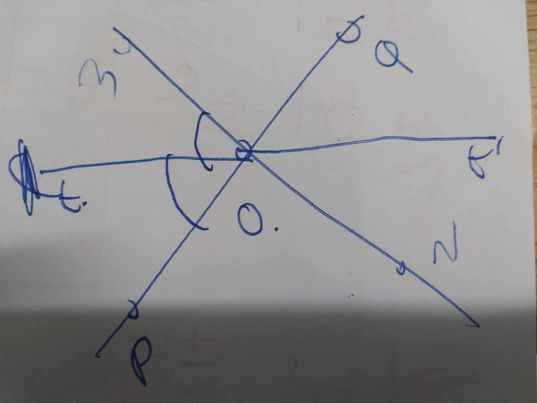
11:
OC là phân giác của góc AOB
=>\(\widehat{AOC}=\widehat{BOC}=\dfrac{50^0}{2}=25^0\)
\(\widehat{DOE}=\widehat{BOC}\left(=25^0\right)\)
=>\(\widehat{DOE}+\widehat{DOB}=180^0\)
=>OB và OE là hai tia đối nhau
=>Hai góc đối đỉnh là \(\widehat{BOC};\widehat{DOE}\)
=>Chọn D
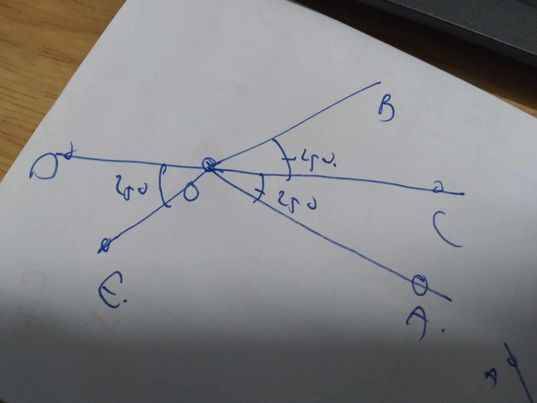
12:
\(\widehat{AOC}+\widehat{AOD}=180^0\)
\(\widehat{AOC}-\widehat{AOD}=50^0\)
Do đó: \(\widehat{AOC}=\dfrac{180^0+50^0}{2}=115^0;\widehat{AOD}=115^0-50^0=65^0\)
=>\(\widehat{BOC}=\widehat{AOD}=65^0\)
=>Chọn B
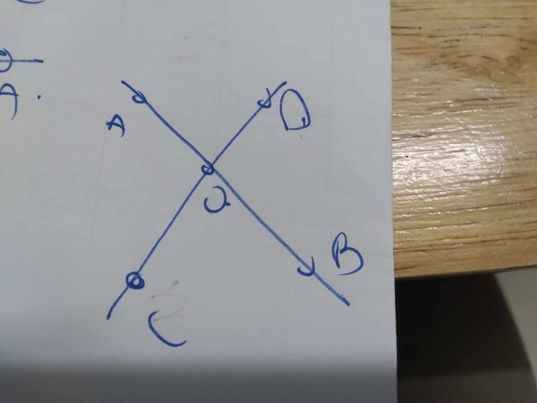


4. \(\dfrac{-3}{2}+x-\dfrac{5}{4}=\dfrac{-1}{3}-2x\)
<=> \(\dfrac{-18}{12}+\dfrac{12x}{12}-\dfrac{15}{12}=\dfrac{-4}{12}-\dfrac{24x}{12}\)
<=> -18 + 12x - 15 = -4 - 24x
<=> 12x + 24x = 18 + 15 - 4
<=> 36x = 29
<=> x = \(\dfrac{29}{36}\)
6. \(\dfrac{3}{4}x-\dfrac{3}{2}=\dfrac{5}{6}+\dfrac{3}{8}x\)
<=> \(\dfrac{18x}{24}-\dfrac{36}{24}=\dfrac{20}{24}+\dfrac{9x}{24}\)
<=> 18x - 36 = 20 + 9x
<=> 18x - 9x = 20 + 36
<=> 9x = 56
<=> x = \(\dfrac{56}{9}\)
7. \(3-\left(\dfrac{1}{2}+2x\right)=\dfrac{2}{3}-x\)
<=> \(3-\dfrac{1}{2}-2x=\dfrac{2}{3}-x\)
<=> \(\dfrac{18}{6}-\dfrac{3}{6}-\dfrac{12x}{6}=\dfrac{4}{6}-\dfrac{6x}{6}\)
<=> 18 - 3 - 12x = 4 - 6x
<=> 15 - 4 = 12x - 6x
<=> 11 = 6x
<=> x = \(\dfrac{11}{6}\)

Ta có:
\(\dfrac{x}{10}=\dfrac{y}{5}\)
\(\Rightarrow\dfrac{x}{20}=\dfrac{y}{10}\) \(\left(1\right)\)
\(\dfrac{y}{2}=\dfrac{z}{3}\)
\(\Rightarrow\dfrac{y}{10}=\dfrac{z}{15}\) \(\left(2\right)\)
Từ \(\left(1\right)\) và \(\left(2\right)\)
\(\Rightarrow\dfrac{x}{20}=\dfrac{y}{10}=\dfrac{z}{15}\)
Lại có:
\(\dfrac{z}{15}=\dfrac{4z}{60}\)
Áp dụng tính chất của dãy tỉ số bằng nhau,ta có:
\(\dfrac{x}{20}=\dfrac{y}{10}=\dfrac{4z}{60}=\dfrac{x+4z}{20+60}=\dfrac{240}{80}=3\)
\(\Rightarrow x=3\cdot20=60\)
\(y=3\cdot10=30\)
\(z=3\cdot15=45\)

Câu 5:
\(\dfrac{13}{6}+x=-2,4\)
\(\Rightarrow\dfrac{13}{6}+x=-\dfrac{12}{5}\)
\(\Rightarrow x=-\dfrac{12}{5}-\dfrac{13}{6}\)
\(\Rightarrow x=-\dfrac{137}{30}\)
Câu 6:
\(3,7-x=\dfrac{7}{10}\)
\(\Rightarrow\dfrac{37}{10}-x=\dfrac{7}{10}\)
\(\Rightarrow x=\dfrac{37}{10}-\dfrac{7}{10}\)
\(\Rightarrow x=3\)
Câu 7:
\(\dfrac{3}{7}+x=\dfrac{2}{14}\)
\(\Rightarrow\dfrac{3}{7}+x=\dfrac{1}{7}\)
\(\Rightarrow x=\dfrac{1}{7}-\dfrac{3}{7}\)
\(\Rightarrow x=-\dfrac{2}{7}\)
Câu 8:
\(\dfrac{3}{7}\cdot y=\dfrac{-2}{5}\)
\(\Rightarrow y=\dfrac{-2}{5}:\dfrac{3}{7}\)
\(\Rightarrow y=\dfrac{-2}{5}\cdot\dfrac{7}{3}\)
\(\Rightarrow y=-\dfrac{14}{15}\)

Chọn D.
Thay \(x=-1\) vào A ta được:
\(A=\left|x-2,3\right|-\left|-1,5\right|=\left|-1-2,3\right|-\left|-1,5\right|=3,3-1,5=1,8\)

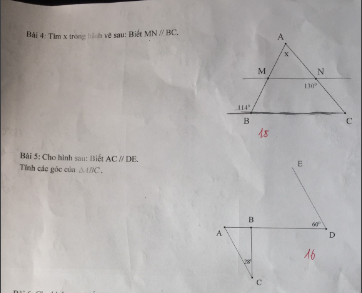 giúp mik với ạ mik cần gấp. GIẢI CỤ THỂ GIÚP MIK vs ạ
giúp mik với ạ mik cần gấp. GIẢI CỤ THỂ GIÚP MIK vs ạ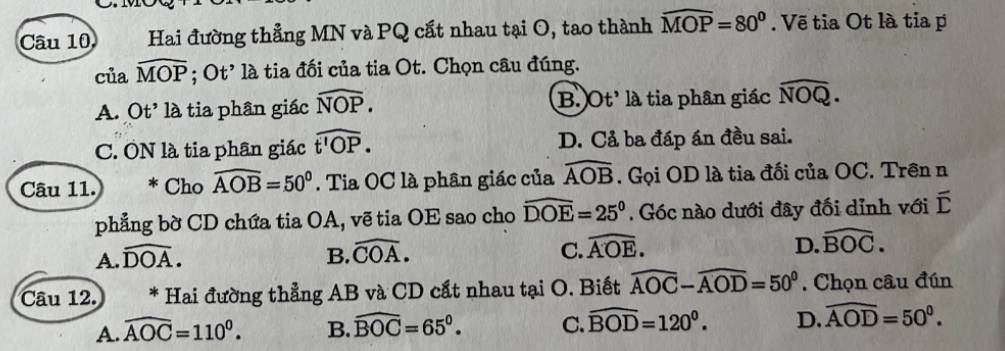 vẽ hình giúp e ạ có gì giải ra ạ em cảm ơn ạ=))
vẽ hình giúp e ạ có gì giải ra ạ em cảm ơn ạ=))


